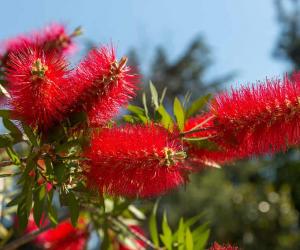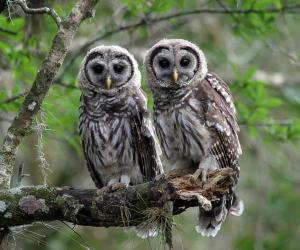The Top 15 Exotic Animals You Can Own in New Jersey
Key Points
- NJ residents may own exotic animals with an Individual Hobby Wildlife Species Possession Permit.
- Certain animals do not require a permit to own because they are native to NJ or count as livestock.
- Residents may only obtain an exotic animal through reputable breeders or official exotic animal locations that provide government-approved documents legalizing their business.

©Andrew F Kazmierski/iStock via Getty Images
According to the World Population Review, a study revealed that 47.7% of New Jersey residents own a pet(s). Modern-day young adults prefer to have a pet than have children because it is cost-effective, and animals rarely grow out of their “puppy” or “kitten” phase since their humans become their surrogate parents.
Still, the idea of owning a different animal will always pique one’s curiosity. Raccoons are small, cute, and around the size of a small-to-medium dog, some foxes look identical to dogs, and skunks are as big as a housecat; if they are comfortable with people, can they be considered pets?
In NJ, it is legal to own some exotic animals, with legal permission. Let’s dig into some exotic animals NJ residents can own, how they can obtain those animals, and what requirements they need to care for these animals.
Exotic Animal Ownership in NJ
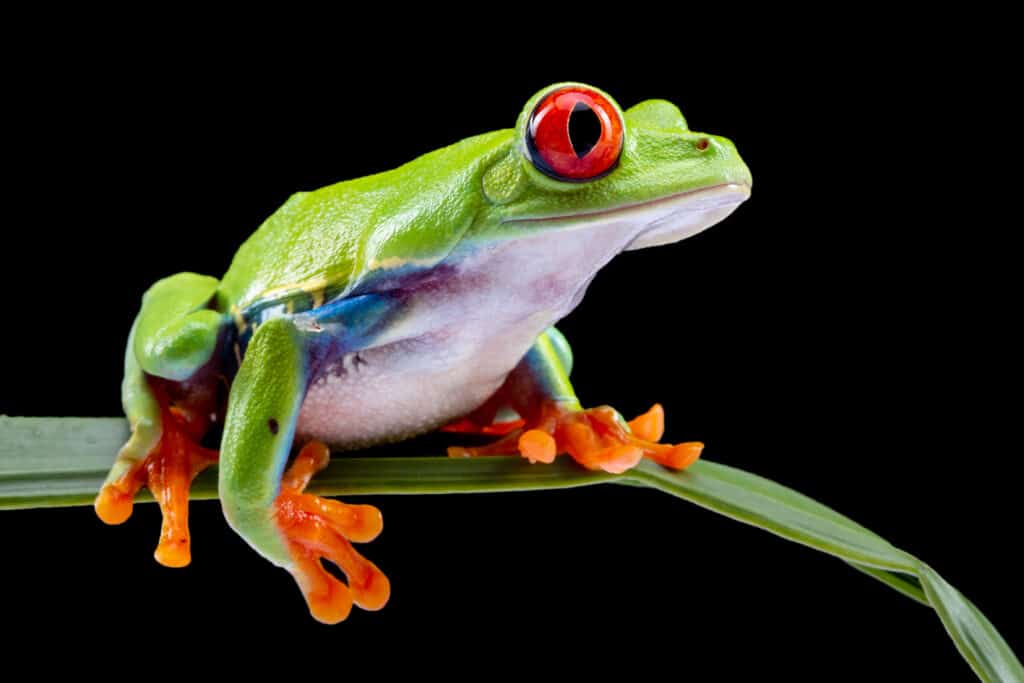
©Dave Denby Photography/Shutterstock.com
For NJ residents to own an exotic animal, they require two things that everything revolves around, money and paperwork.
Costly
Exotic animals range from small animals, birds, reptiles, fish, marsupials, and farm animals. They are not like traditional cats and dogs that need some food, water, and a few walks to keep them healthy. Exotic animals are not fully domesticated and will require customized treatment and diets to meet their needs.
Additionally, owners must find an exotic animal veterinarian to tend to their new pet for check-ups and health emergencies. Normal veterinarians may not be educated on their exotic animals, making finding an exotic animal veterinarian difficult and slightly more expensive.
Also, several exotic pets need terrariums to simulate their natural habitat. For instance, several exotic reptiles like chameleons require specific levels of humidity to keep them healthy. Without it, they may quickly grow sick or have trouble shedding. Crickets must be dusted with calcium powder, so they get proper nutrition because crickets alone are not enough. Neglecting any one of a dozen situations will lead to health issues.
Exotic animals are not fully domesticated and they are not comfortable being indoors. They may cause a lot of damage by chewing or scratching furniture while they adjust or to relieve their natural instincts.
Permits
Exotic pet parents need permits to show authorities that the parent legally owns the animal. For NJ, residents must have the Individual Hobby Wildlife Species Possession Permit. The permit costs around $20, with larger animal permits costing $50. Residents are given the permit on the day of purchasing their exotic animal.
Permits expire December 31st unless stated otherwise. Pet owners must renew their permits and licenses with the NJ Department of Environmental Protection’s Fish and Wildlife Program.
Finding Exotic Pets in NJ
Knowing it is legal to own an exotic animal in NJ does not make it legal to take a wild animal off the streets. Wild animals are protected by wildlife laws and housing one illegally will result in hefty fines of $500 or more.
Potential pet parents should purchase exotic animals from reputable exotic animal breeders, or official exotic animal locations capable of providing government-approved documentation.
Reputable exotic animal stores in NJ are:
- NJ Exotic Pets in Lodi
- Garden State Pet Expo
- BM Exotic Pets in Dumont
- Lacey Pet in Forked River
Popular Exotic Pets to Own in NJ
Now, with the prefacing and set-up done, let’s get into the fun part of what animals NJ residents can own.
Skunks
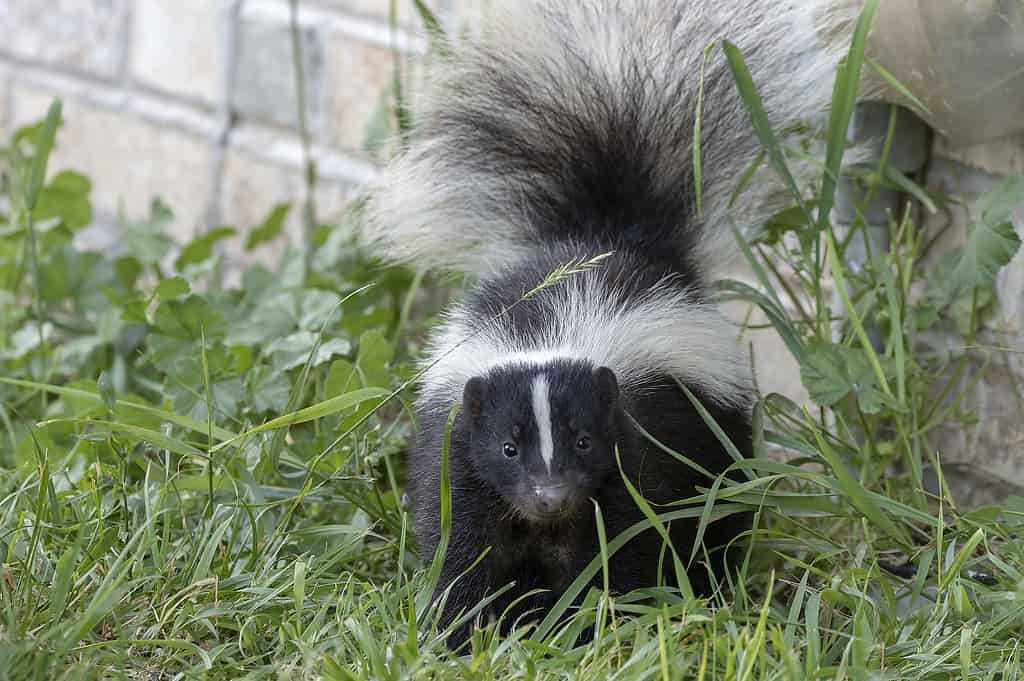
©Karel Bock/iStock via Getty Images
| Permit Required | Weight (pounds) | Lifespan | Care Level | Diet | Litter Trained |
| Yes | 6-14 | 15 years | Moderate | Omnivores | Yes |
Skunks love to dig and scratch their surroundings. They need plenty of stimulation or else they will damage tables, couches, beds, and other furniture. Skunks are active during dawn and dusk and will learn their parent’s schedule.
Skunks eat a combination of proteins like eggs, chicken, insects, and nuts, with assorted vegetables.
Pet parents should spend plenty of time with their pet skunks to raise a strong bond. Skunks may become affectionate with their owners, allowing them to be carried in their hands and brushed regularly.
All skunks have their spray glands removed at an early age before being sold to parents.
Opossums
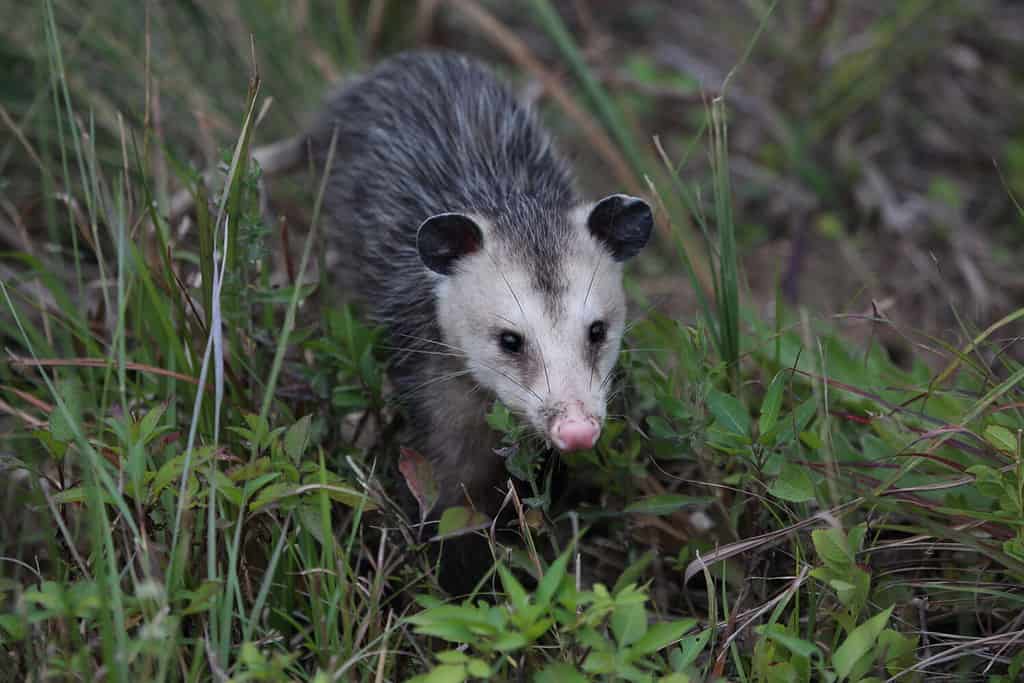
©Arend Trent/Shutterstock.com
| Permit Required | Weight (pounds) | Lifespan | Care Level | Diet | Litter Trained |
| Yes | 4-12 | 8 years | Difficult | Omnivores | Possible |
Opossums are not domesticated and are difficult to handle as pets. They need a lot of space to climb and explore and do not perform well in cages or confined spaces.
Opossums need a strict diet of insects or healthy protein like eggs and chicken, supplemented with vegetables. Exotic animal suppliers will have food for opossums available at their locations.
Unfortunately, opossums do not live very long. In the wild, they typically live three years before succumbing to disease or predators. In captivity, they can live up to eight years, but it is a brief time compared to other animals.
Raccoons
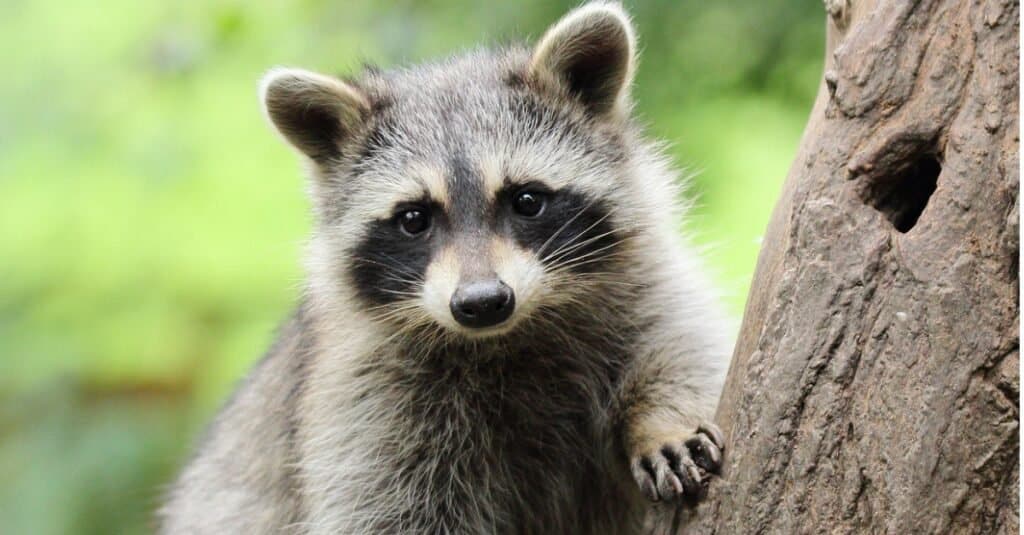
©iLUXimage/Shutterstock.com
| Permit Required | Weight (pounds) | Lifespan | Care Level | Diet | Litter Trained |
| Yes | 10-20 | 20 years | Medium-Difficult | Omnivores | Possible |
Raccoons are an immensely popular animal to own in NJ because they are found in almost every backyard. They are mischievous little animals that love to explore their surroundings and climb onto anything they see. Raccoons require constant supervision, so they do not damage the house with their climbing, scratching, or chewing.
They require a diet of chicken, rabbit, fish, eggs, mealworms, crickets, vegetables, and fruits.
Parents should allow their raccoons to roam the house, offering them a tall cage to sleep with their toys. With constant time and attention, raccoons may grow comfortable to snuggle with their owners. However, raccoons will give love bites to show they care, which can be painful due to their sharp teeth.
Raccoons should not be left with other animals because they may attack smaller animals as prey.
Kinkajou
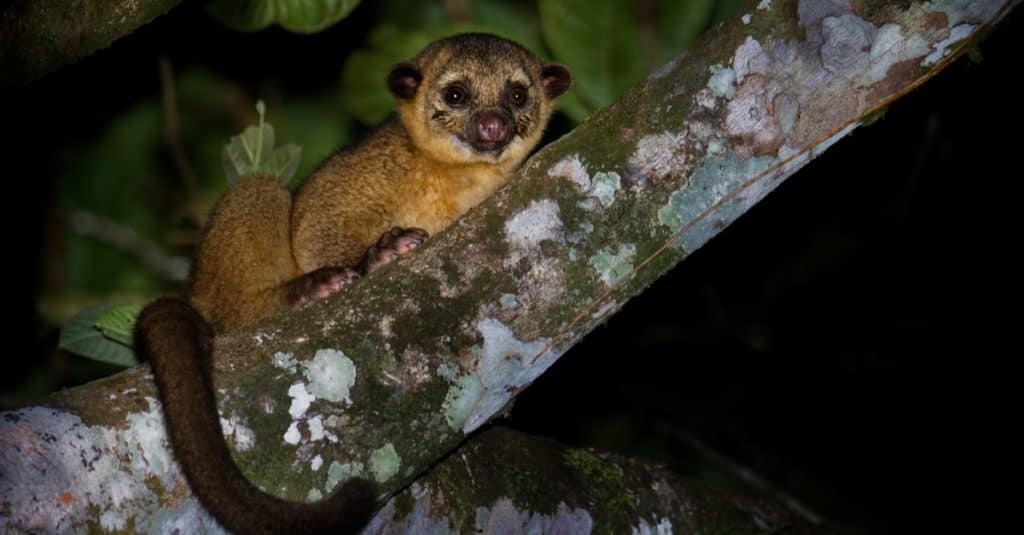
©Martin Pelanek/Shutterstock.com
| Permit Required | Weight (pounds) | Lifespan | Care Level | Diet | Litter Trained |
| Yes | 10 | 20-25 years | Difficult | Omnivores | Unlikely |
Kinkajous are small, monkey-like creatures related to raccoons. They live in trees and love socializing with their families.
However, kinkajous are notoriously difficult pets. Their curious nature makes them climb and leap onto everything they see, possess elevated levels of aggression, and bite their owners or anyone who comes too close. They will throw their food and they are extremely difficult to potty train.
Kinkajous love eating fruits, veggies, lean meats, and insects. Fruits should be moderately given because kinkajous are prone to dental disease from high-sugar foods.
Kinkajous are nocturnal and very vocal animals. Parents should be prepared to wake up to a howling monkey in the middle of the night.
Coatimundis (Coati)
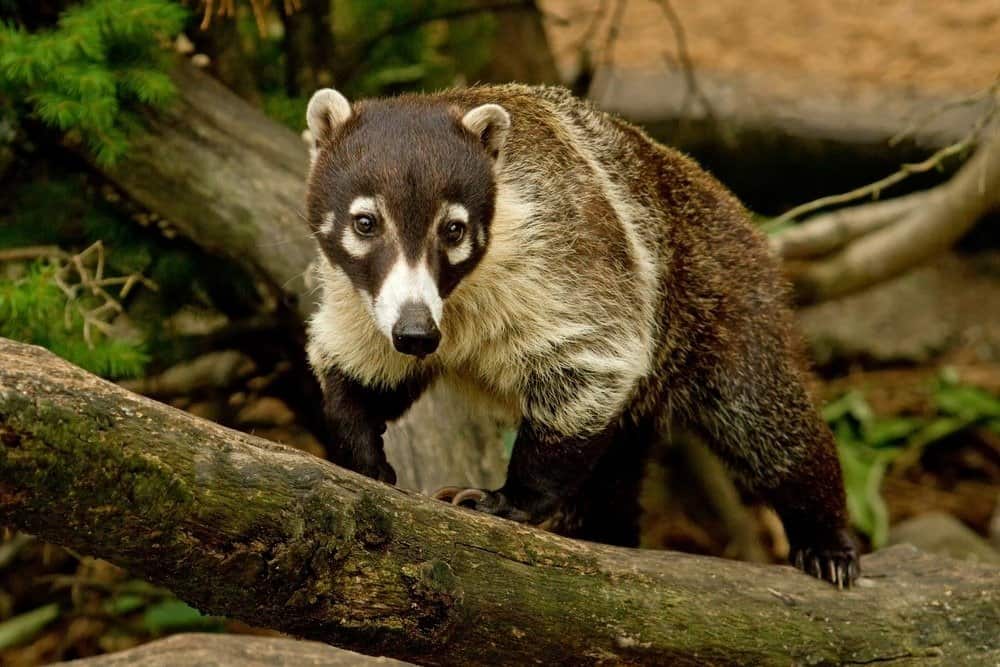
©Cynthia Kidwell/Shutterstock.com
| Permit Required | Weight (pounds) | Lifespan | Care Level | Diet | Litter Trained |
| Yes | 7-14 | 14 years | Medium-Difficult | Omnivores | Yes |
Coatis are cousins to raccoons, which is easily seen in their long-ringed tails and masked faces. They have a lot of energy and need constant supervision and socialization to keep them active and amused. They do not handle being caged well, needing a lot of space to climb and explore.
Parents are advised to wear thick gloves when handling coatis because their thick claws may leave deep cuts when playing or holding. Coats may also get aggressive if they are not neutered or spayed.
Coatis can be trained slightly more easily than other exotic animals. They learn how to use the litter box and go for walks on a leash.
Their diet consists of insects, lean meats, vegetables, and fruits.
Sugar Gliders
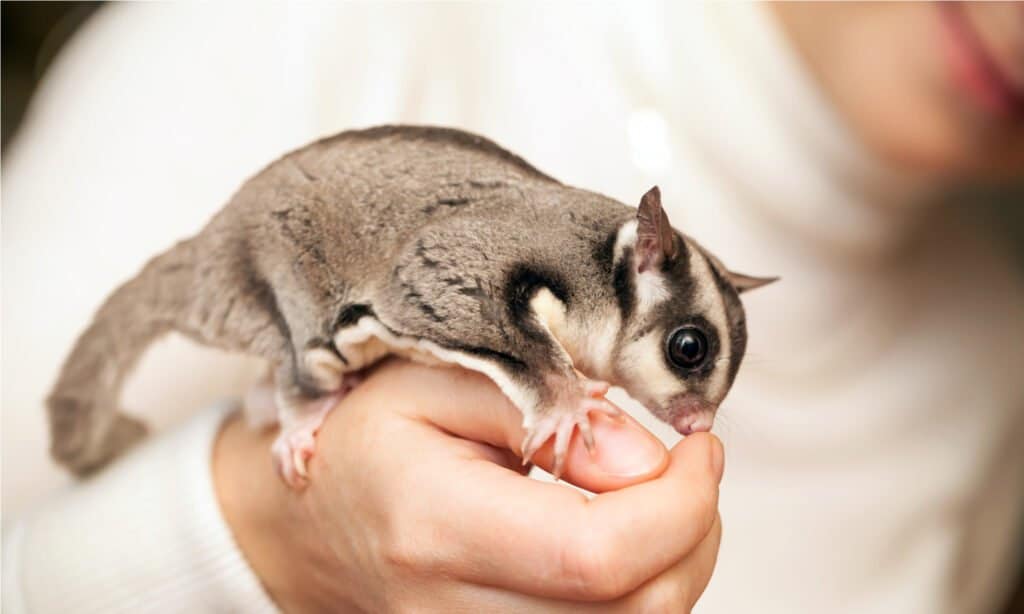
©Evannovostro/Shutterstock.com
| Permit Required | Weight (pounds) | Lifespan | Care Level | Diet | Litter Trained |
| No | 4 ounces | 10-15 years | Medium | Insectivore | Possible |
Sugar gliders are tiny flying squirrel-like animals that are excellent climbers and love to cuddle. Perhaps a bit too much since sugar gliders experience separation anxiety when alone for too long. When parents buy a sugar glider from a pet store, the staff will recommend buying two to keep each other company. Several reports indicate sugar gliders self-harm if they’ve been alone for extended periods.
Despite their overly anxious personalities, sugar gliders are non-aggressive, easy to house in a long cage with a hammock for them to sleep, and nontoxic liner or litter for their cage.
Feed sugar gliders a strict diet of insects, vitamin supplements, and fruits.
Ferrets
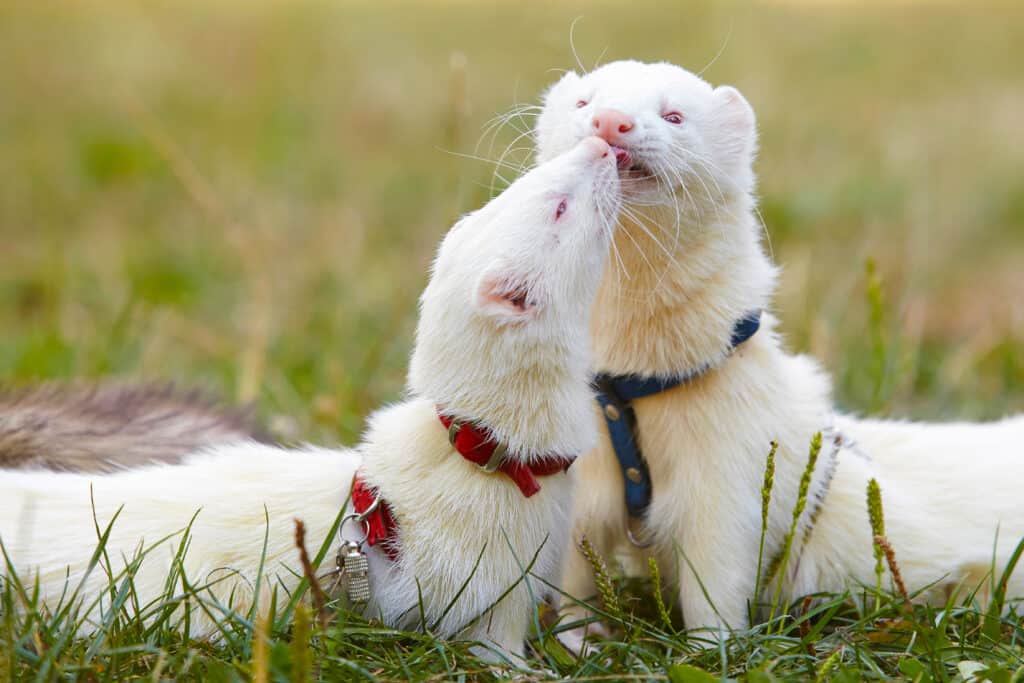
©Couperfield/Shutterstock.com
| Permit Required | Weight (pounds) | Lifespan | Care Level | Diet | Litter Trained |
| Yes | 2-4.4 | 5-10 years | Easy – Medium | Hypercarnivores | Yes |
Ferrets are tiny weasel animals who are notorious for stealing objects and hiding them in dens throughout the house. They will grow loving toward their owners or other ferrets when living together. To prevent ferrets from stealing valuable objects, provide them with several toys and play with them often.
Ferrets are hypercarnivores, meaning they need a strict diet of all meat. A customary practice to feed a ferret is establishing a “frankenmeat,” which is creating a fake animal made from different organs for the ferret to eat.
Because of strong scent glands near their anus, ferrets can produce strong odors. However, these odor issues can be prevented if they are given a healthy, all-meat diet.
Hedgehogs
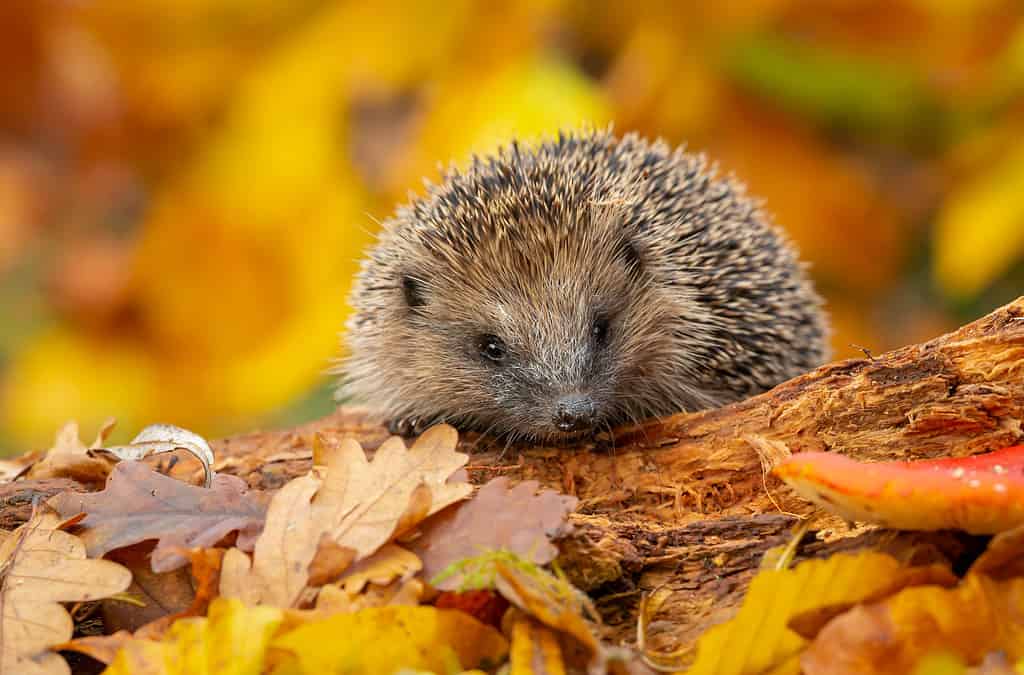
©Anne Coatesy/iStock via Getty Images
| Permit Required | Weight (pounds) | Lifespan | Care Level | Diet | Litter Trained |
| Yes | 1-2 | 2-8 | Easy-medium | Insectivore | Yes |
Hedgehogs are adorable little rodents with pointy noses and tiny spines across their body. When afraid, hedgehogs will curl up into a ball, extending their spines to prevent predators from touching or reaching their soft underbelly.
Owners must provide their hedgehog with vitamin powdered insects and supplement powders to balance their diet. Pet hedgehogs are commonly diagnosed with malnutrition because of an improper diet.
Typically, hedgehogs are solitary animals, content with living in a wide cage with several toys, easy access to food and water, and an exercise wheel. Some may enjoy running around in a large hamster ball so they may explore the house. While timid at first with new owners, they will open up to their adoptive parents.
Red and Flying Squirrels
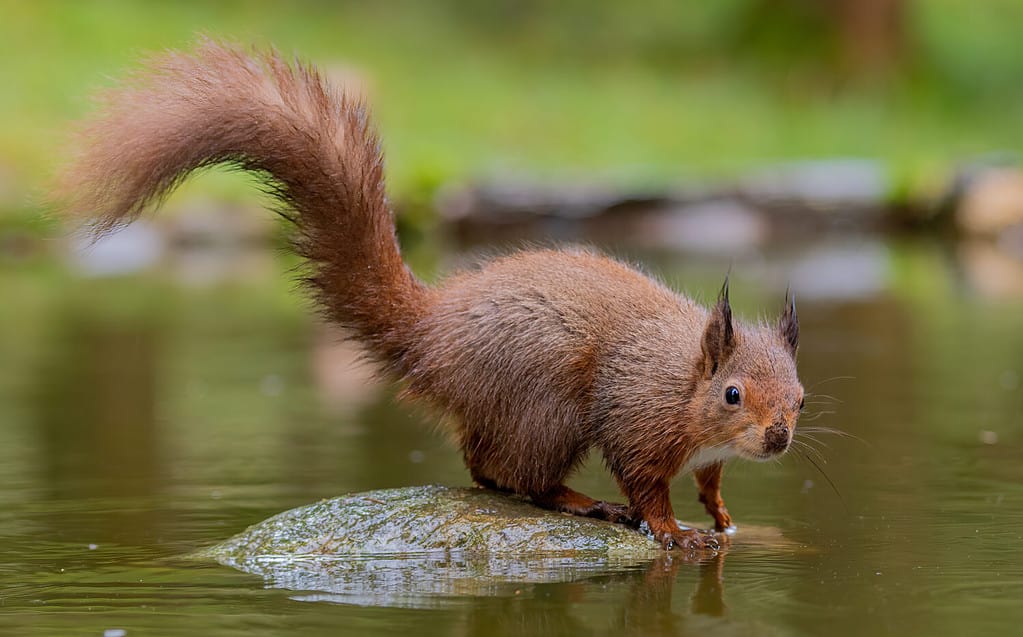
©Sam Robertshaw/Shutterstock.com
| Permit Required | Weight (pounds) | Lifespan | Care Level | Diet | Litter Trained |
| None | Flying: 2.5 ounces Red: 12 ounces | 3-10 years | Medium | Seeds, berries, nuts | Possible |
Squirrels are all over NJ, and everyone has thought of owning one at one point or another. They are small, eat mostly nuts, berries, and seeds, and seem harmless from a distance while watching them race through yards.
Owning a squirrel is not too difficult but does require some patience and attention. Squirrels are mischievous rodents who will climb on anything they see and try to forage food to hide in their cage or somewhere in the house. They are not truly domesticated, so their instincts drive them to forage and store food for winter.
Squirrels can be litter trained, but training must begin at an early age. Others can be taught to perform small tricks like grabbing food, owners must be patient and consistent with the training.
Ostriches
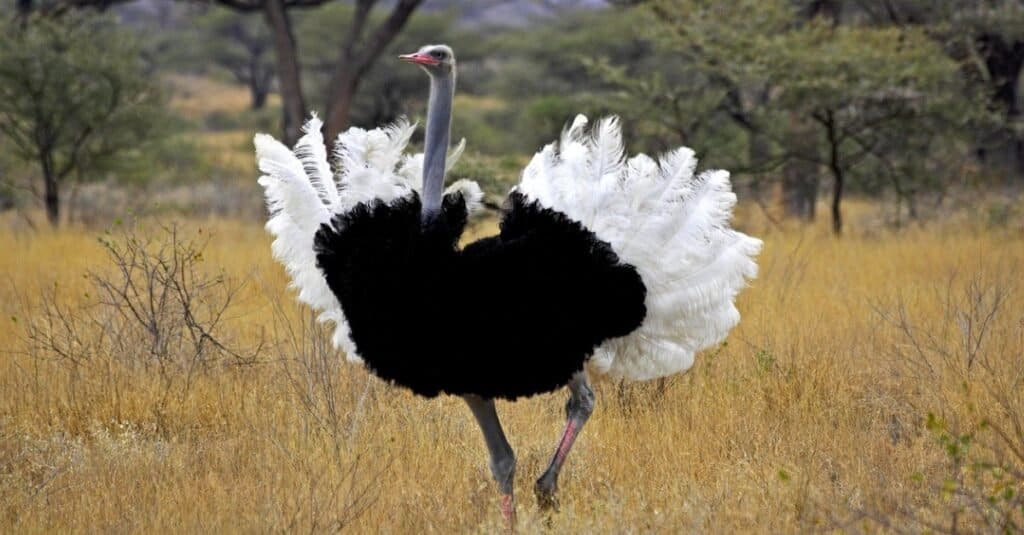
©iStock.com/slowmotiongli
| Permit Required | Weight (pounds) | Lifespan | Care Level | Diet | Litter Trained |
| No | 250-320 | 30-70 years | Medium-Difficult | Omnivores | No |
That’s right, NJ residents can own an ostrich without a permit. Ostriches count as livestock, meaning if an NJ resident has enough space, they may build an ostrich farm to sell eggs or their molted feathers.
Ostriches primarily eat plants but will consume insects, snakes, lizards, and rodents if given the chance. They do not chew their food, so ostriches will consume sand and small rocks to help break down their food in their stomachs.
Be warned, ostriches are not typical pets to play with or use for rides. They are seven-foot-tall birds with a kick strong enough to break bones and cause internal damage. Ideally, ostriches should have plenty of yard space to freely run around and a place they can rest for inclement weather.
Toucan
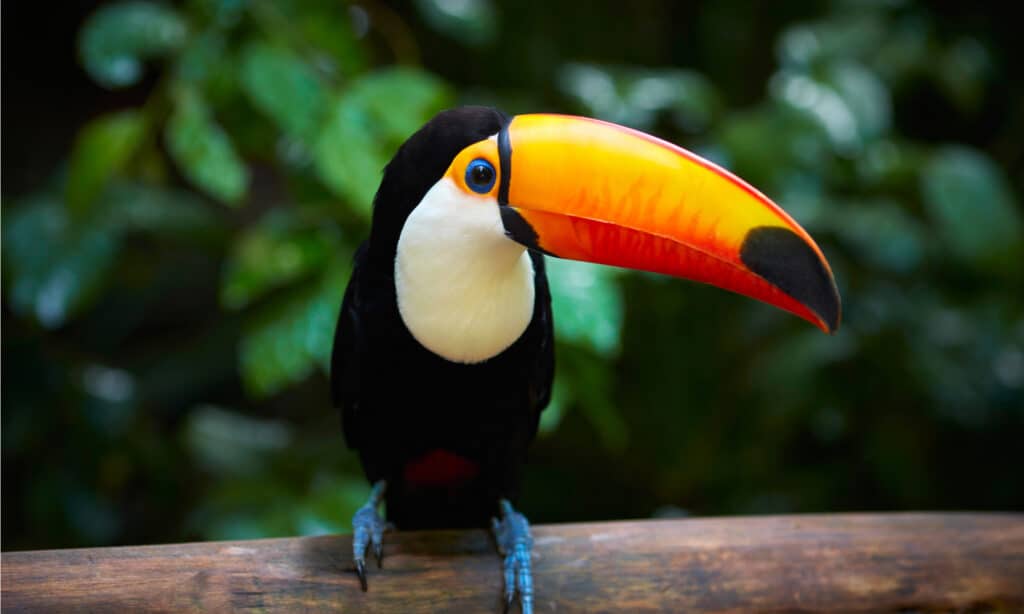
©SJ Travel Photo and Video/Shutterstock.com
| Permit Required | Weight (pounds) | Lifespan | Care Level | Diet | Litter Trained |
| Yes | 1.4 | 12-20 years | Expert | Frugivorous | No |
NJ has strict laws regarding exotic birds. While toucans are legal, extra permits may be required to keep them in a residential area.
Only expert bird enthusiasts should own toucans because they can be a handful to care for. They love playing with their food, flinging it into the air before catching it in their beaks. They are quite chatty and make a lot of noise. Provide toucans with a long, horizontal cage with multiple branches for them to hop.
The Toucan diet consists mostly of fruits, but they will also eat insects and rodents.
Also, toucans are extremely expensive to own. Reputable exotic animal places sell toucans for around $4,000-$6,000.
Macaws
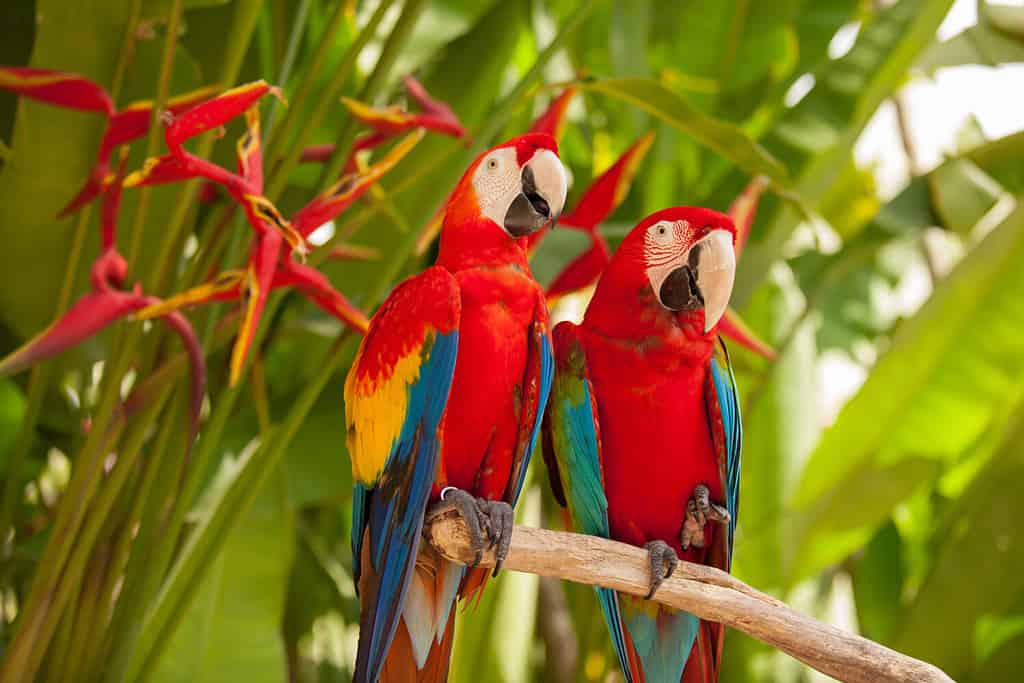
©Katia Titova/Shutterstock.com
| Permit Required | Weight (pounds) | Lifespan | Care Level | Diet | Litter Trained |
| Yes | 2-4 | 30-50 years | Difficult | Frugivorous | No |
When it comes to expensive and exotic birds, the macaw is one of the top birds an owner could ask for. Macaws are iconic parrots with red feathers, a large hooking beak, and bright blue feathers on the wings that can mimic the speech of their owners.
Feed macaws a diet of various fruits, nuts, and seeds, interlaced with snails or insects for protein.
On average, a macaw can cost approximately $4,000.
Ball Pythons
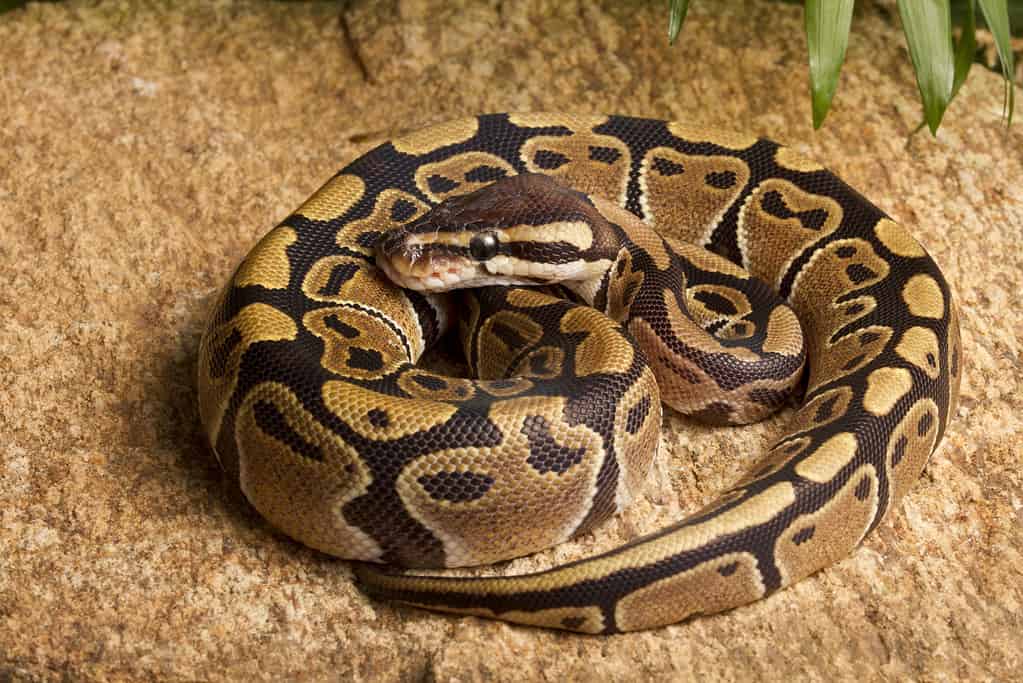
©David Kenny/iStock via Getty Images
| Permit Required | Weight (pounds) | Lifespan | Care Level | Diet | Litter Trained |
| Yes | 3-5 | 10-20 years | Beginner | Mice | No |
Ball pythons are an excellent start for first-time reptile enthusiasts who want to own a snake and understand the nuances of terrarium care. Their terrarium should have a warm and cool side to allow them to sunbathe comfortably and cool off when too warm. The basking (warm side) should be 88-92 degrees Fahrenheit with the cooler side being 75-80 degrees Fahrenheit. Use a misting bottle to keep the humidity between 60-70%.
Ball pythons are very curious and will explore their terrarium throughout the day when not regulating their temperature. Some may learn how their terrarium opens and try to climb out to explore the rest of the house.
These snakes are very friendly and will grow comfortable where owners can pet or pick them up. Owners should wash their hands before and after touching the serpent to prevent the snake from getting sick.
Gargoyle Geckos
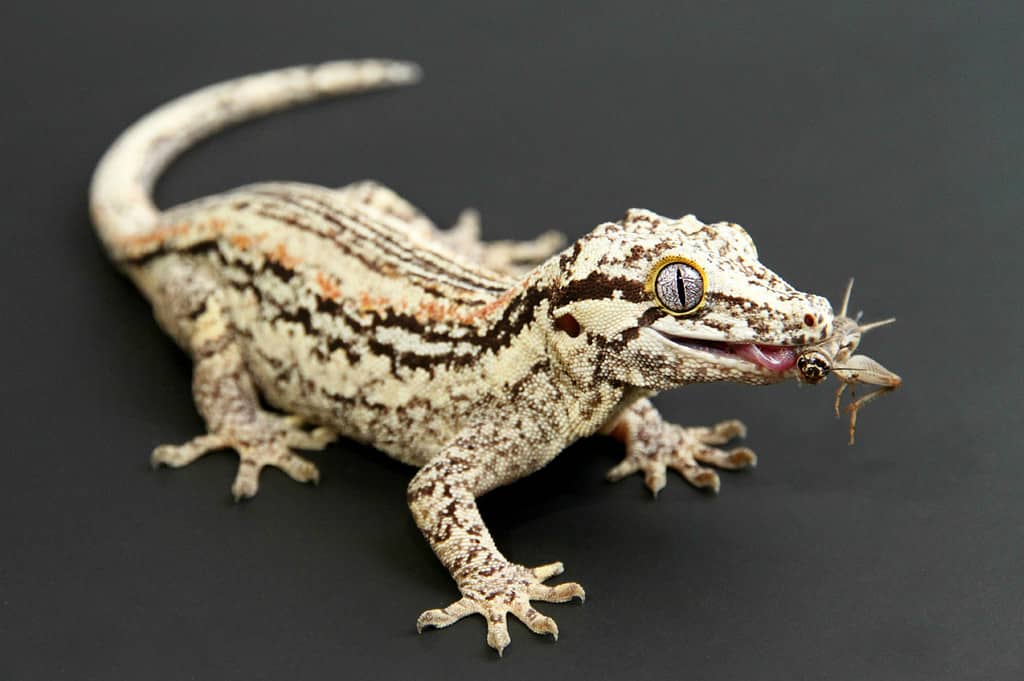
©Naturesauraphoto/Shutterstock.com
| Permit Required | Weight (pounds) | Lifespan | Care Level | Diet | Litter Trained |
| Yes | 65 grams | 15 years | Beginner | Insectivore | No |
Gargoyle geckos are a unique gecko species that love perching in trees and blending into their environment. Their small “horns” over their ears while they perch make them look like small gargoyles watching from above.
They are also remarkably simple beginner reptiles to own because they require little attention and handling and survive very well in a tall terrarium and plenty of food. Their terrarium should have a normal temperature of 72-78 degrees Fahrenheit, with humidity levels between 60-80%.
Provide them with plenty of dusted crickets with a few fruits as treats.
Wallaby
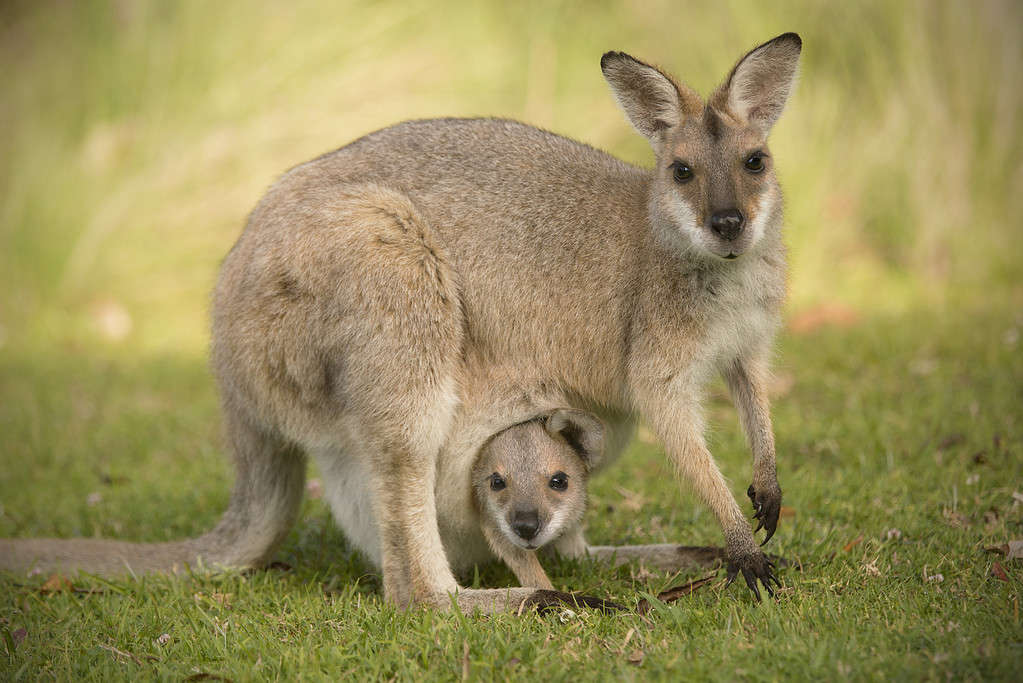
©Shmenny50/ via Getty Images
| Permit Required | Weight (pounds) | Lifespan | Care Level | Diet | Litter Trained |
| Yes | 5-53 | 11-14 years | Medium | Herbivore | Possible |
Wallabies are basically like tiny kangaroos, except you can own one as a pet in NJ. It is better to adopt a wallaby when they are young, giving the owners a chance to closely bond with their new marsupial. As wallabies grow up, they will grow comfortable with people and their owners where they might snuggle some days and go for leashed walks other times.
These marsupials are herbivores, eating grasses, leafy plants, and roots in the wild. They might double as a living lawnmower if left outside for too long, but it is healthier if they are given wallaby-specific food.
Wallabies have a lot of energy to burn off. Owners need a nice backyard with a tall fence to help vent out their excess energy, without them bounding over a gate and escaping. They have extraordinarily long tails that may bump into objects or knock furniture over, but they will avoid causing damage if trained at an early age. While they are young, owners can carry them around in a pouch to simulate what mothers would do for their children. This will strengthen the bond between a wallaby and its owner quickly.
